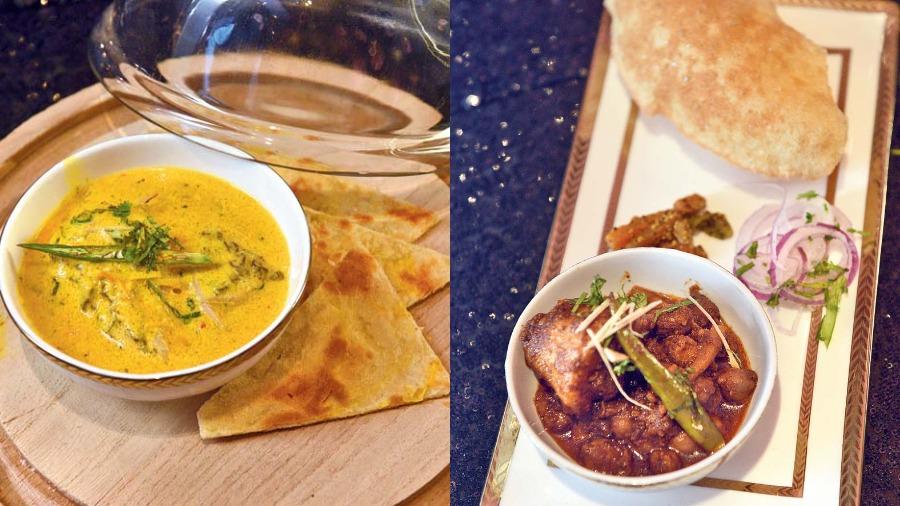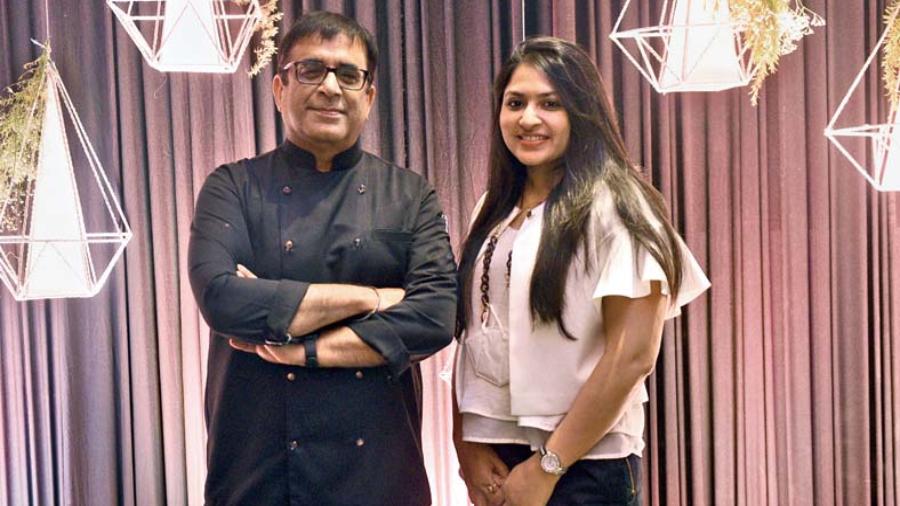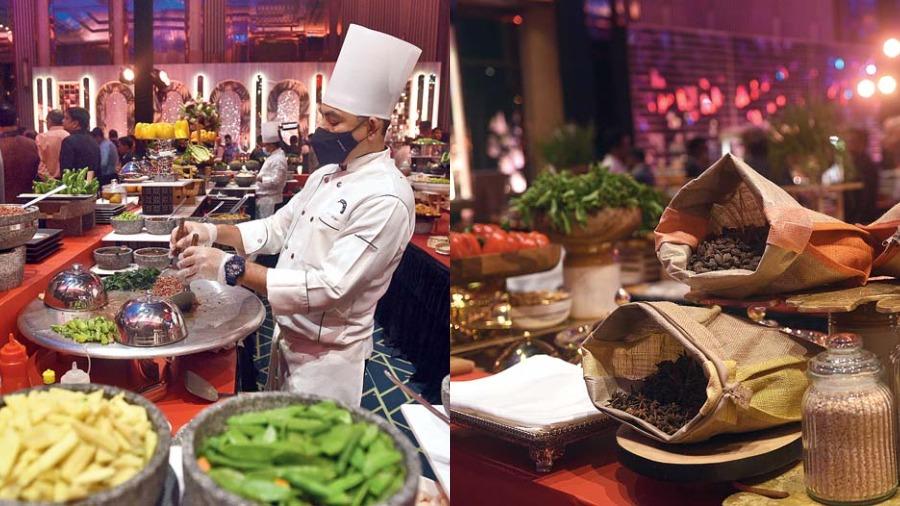After rustling up a storm at The Park Kolkata kitchen for years, chef Sharad Dewan has embarked on a new journey as director at Gourmet Design Company (GDC). A brainchild of Dipti Modi, founded in 2019, GDC also has popular event and destination wedding company Mirage on board along with collaborations with chefs Ritu Dalmia and Puneet Sikand.
The Telegraph chatted with Chef Sharad Dewan, Dipti Modi and Puneet Sikand on what GDC stands for, its plans and more.
It’s been a long journey with The Park as regional director of food production. What made you take to a new journey with GDC?
Sharad Dewan: It’s been a lovely journey with The Park for 15-plus years but now it was time to move ahead and do something different. And with GDC I felt I could create more experiences and narrate more food stories, through multiple means, to a wider audience across the globe .
Tell us about GDC....
Sharad: At Gourmet Design Company (GDC), a young brand of a year that likes to call itself a Concept, designing those stories is what we do best. We believe that food is not just a product but a rich cultural fabric that can be netted, looped, knit to create a breathtaking tapestry of experience, with little thought, creativity, understanding and of course bright culinary minds.
Dipti: We are a brand driven by the thought of “telling stories through food”, is a convergence of such individuals, men and women who have aced the art of taking the tangibles and transforming it into unforgettable intangible moments. We, at GDC, believe that no two occasions are alike, and hence have ranked customisation as our prioritised work mode, be it with our guests or the resources we have to create an exceptional experience.
So, how do you plan the layout?
Sharad: At GDC we are bringing the food inwards. Usually one would notice that food is something everyone would lay out outside but we want to break that. For example, we set up the buffet in a different format, we do food installations.... We have plates located at every counter and sections so that people can taste the specific cuisine in that plate and not have to pile up or mix cuisines in one. We work on detailing on every section: food, cocktail or mocktail can be done in the best way possible.
Dipti: We sit with the family and event manager and hear all about your wishes and aspirations about the celebrations. Our ‘food mood board’ is designed on the stories presented and previewed with the guest. Our curated menus are spindle whorls in sync with various sources, the strengths and weaknesses of the food providers and the season, but always keeping in mind the food story and budgets.
There are many hotels thriving in the banqueting space in terms of food. Why do you think you need to come in?
Sharad: Yes, they are good but we aim to take the experience higher and rise from the basic. I push all hotels to deliver their best and I being senior and being in the industry for so long they have that respect for me.
For example, we take food designing and layout very seriously... like we use a lot of ingredients in the counters. If a counter is done with aubergine or makhana spilling out from a sack, it indicates those counters will offer something with makhana or aubergine. So in a very subtle way.
Trend-wise, what kind of food do guests like? Is it more interactive or a buffet set-up?
Sharad: It is 85 per cent interactive!
Dipti: Post-pandemic we have seen that people prefer more live counters because food stays fresh and cooked right in front. Where as in a buffet multiple people are touching the ladle, food is lying open for a long time.
Sharad: Food stays hotter too but we do keep some buffet food too because many people want to come early, eat and leave. Now, many guests want a few food items if needed but they want food from live counters.

We tried some dishes straight out of a wedding function and got blown away. From plating to robust tastes, everything was top-notch.
In terms of cuisine, what kind of food are in demand?
Sharad: Experimental. They want a story behind whatever they are eating, it doesn’t have to be molecular gastronomy. They want to relate to the food. We like this kind of trend because the moment a cuisine becomes a trend it limits you. When guests want to experiment you can do that with any cuisine.
We noticed that the food served by you is done in different and unique cutlery and crockery....
Dipti: Yes, because it adds to the whole experience. What we serve the food in depends on the theme and occasion, like we had one party where it was chaats so we had interesting disposables. We get them from different sources. We work closely with a selected team of caterers, event planners and designers to ensure that it’s the best that comes to our guest. Our exclusive partnership includes not just finest caterers in the country, like TKAC, DIVA, but also the best culinary minds (chefs) in the business of food, pan-India and globally. Our association includes international brands like Nadimos, Al Hamra, Tresind among others along with signature brands like of Laduree (Paris), Sprungli, Laderach and the ilk.
What is the most common mistake people make when it comes to event-centric food?
Puneet Sikand (GDC is exclusively tied with him in the East): Wrong choice of menu as far as catering is concerned. So there are different occasions, like a French guy getting married to a Punjabi girl. Now French people can’t eat spicy food and Punjabis can’t have bland food, in these cases striking the right balance is key. Then if the number of guests goes up remarkably then it is a complete mayhem.
Sharad: Especially when you are doing experiential meals, it’s not langar khana.
Puneet: The youngsters are globetrotting and their Instagram is all about global food. But when they want modern or global food, their aged parents don’t get that and there comes the conflict. So in these situations too we need to keep both parties happy.
How does one deal with food smell, especially with live counters, which sometimes becomes a bother?
The food smell of vegetarian or non-vegetarian dishes in spite of good air circulation will always remain to an extent and that’s when we step in to educate people. We tell them that you are doing a mistake by mixing these two cuisines, or we suggest them not to do too many live counters if the AC is not proper. Sometimes many guests want to go overboard with say more than a hundred dishes... so we try to tell them it’s not about the quantity but quality.
What’s the minimum head-count you work for?
Dipti: Nothing like that. We did a specially curated occasion for just 25 friends of the client. The highest would be 1,500 for a reception in ITC. During lockdowns, especially the second one, for a shaadi the guest list had to be cut down to 100 due to restrictions!
What are some of the challenges faced till now?
Sharad: Sourcing chefs from across the world to fill the gaps, sticking to the budget but bringing in a new experience.
Dipti: We collab with local talents also, like lot of bakers.…
Sharad: We have in the pipeline to bring in home cooks to get one signature dish, give them counter… during the pandemic they did so well. Then sometimes we want to do something unique but many times hotels have limitations so that’s a challenge. Another challenge would be getting good raw materials. With dearth of frequent flights like before from abroad it’s hard to get unique ingredients from across the world. Getting good manpower to support the work we do is also an issue.
Pictures: Rashbehari Das

Chef Sharad Dewan and Dipti Modi. “I am actually an engineer and I have stayed in three different countries but GDC is born purely out of passion. There’s a big gap between the kitchen and F&B staff, so bridging those gaps and creating a story out of the food. Chef Sharad Dewan and I have known each other for a long time so we bounced ideas off each other and we came to the point where we were like... why don’t we work on a food concept, a company that creates food experiences,” said Dipti.
